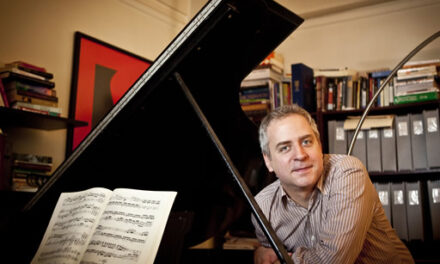The winds, rain and fear from Hurricane Isabel had dissipated, and there were no ill effects felt as far as cancellations of scheduled concerts in the Triangle were concerned….
One of the world’s most beautiful and celebrated cities is celebrating the 300th anniversary of its founding, and Duke University participated in this milestone on September 19. St. Petersburg, Russia (formerly Leningrad, during the days of the Soviet Union), has a history of remarkable achievements in the arts, including one of the great museums in the world – the Hermitage (http://www.hermitagemuseum.org/ [inactive 12/07]).
A program in Duke University’s Baldwin Auditorium was officially billed as “A Concert of Russian Music in Commemoration of the 300th Anniversary of the founding of St. Petersburg, Russia.” Before the program began and during intermission you were surrounded by many people speaking Russian, which helped give the evening an exotic air.
Since this was a birthday of sorts, and since the event was supported by grants from the U.S. Department of Education, I felt there should have been more of an effort to make available literature about St. Petersburg or perhaps have a display in the lobby. Actually, there was no mention at all of this glorious city and the program notes were silent in this regard.
Despite its billing as “A Concert of Russian Music,” the program was more of a tribute to Sergei Rachmaninov (spelled as “Serge” throughout the program). With the extraordinary wealth of composers and styles of Russian music, it seemed a very restricted choice to limit the concert to piano and/or vocal music of primarily one composer. What about at least a movement from the string quartets of Tchaikovsky, Borodin, or Shostakovich, or one of Stravinsky’s chamber works, or something by Prokofiev?
The evening began with four songs by Rachmaninov, presented by soprano Elizabeth Linnartz and pianist Deborah Hollis. These were given in descending order of bleakness with the final one decidedly more optimistic than the previous three. Hollis provided a well balanced and unobtrusive background to the texts, which included poems by Tolstoy and Pushkin. Not speaking Russian, I cannot comment on Linnartz’s pronunciation, although many in the audience could have. What I took exception to was a relentless sameness in her expression and body language, regardless of the text of the song. Rather than using vibrato as a musically expressive effect, there seemed to be an overemphasis on its use in supporting the pitch, resulting in hazy intonation.
Sometimes you hear a musician perform and you wonder how in the world the person is not known by anyone who is even remotely musically literate. This happened within moments of hearing Vladimir Viardo play Rachmaninov. Currently on the faculty at North Texas State University and a guest soloist all over the globe, this musician had the “typical” cold war experience of being an ostracized artist unable to travel outside the Soviet Union until the Iron Curtain fell. His small stature belies the stereotype that in order to play this type of big, Romantic music, you need large hands with a huge span. He played a group of Preludes and Etudes-Tableaux, all by Rachmaninov. Unfortunately I was not able to understand his precise selections, which he announced all at one time before he began playing. The technique displayed by this pianist was nothing short of miraculous – he was spellbinding, and his playing was seeming effortless. I have heard some people scoff at the idea of a “Russian soul” or any other ethnic advantage to playing a particular style of music, but hearing Viardo play these works, you know that he understands and has “lived” the music, even to the point of having his experiences in his DNA. Looking around the audience at the people I had heard speaking Russian, I could see the knowing acknowledgement of this, perhaps mingled with nostalgia for their homeland. There was a huge standing ovation and Viardo came back for an encore. His performance was by far the highlight of the evening and an unexpected delight.
After the buzz from the previous performance slowly wore off, the second half began with a collection of songs and arias by various Russian composers, sung by tenor Dmitry Vladimirovich Karpov and accompanied by Aleksandr Ivanovich Smorodkin. Before this began there was an announcement by the emcee, of sorts, that in keeping with the Russian tradition, it is acceptable to applaud between selections or movements. Karpov is a short, compact man with a very focused, controlled and expressive mid-range tenor. There were seven selections including works by Glinka and Rimsky-Korsakov. Karpov displayed great variety and sensitivity to the text and gave a tremendous amount of physical and emotional energy to each selection.
The program concluded with selections from Rachmaninov’s Vespers, one of the great masterpieces of Russian choral music. As we have taken for granted here for so many years, Rodney Wynkoop had his Choral Society of Durham impeccably prepared, and they gave an outstanding performance. The earlier allowance of between-movement applause did not go over well with the conductor, and this seemed to impede at least one of transitions between sections. It seemed a bit disconcerting to have accompanist Jane Lynch all dressed up and sitting at the piano with nothing to play except the starting pitches. It is always nice to get to hear one of Wynkoop’s groups in a venue other than Duke Chapel, and the decidedly drier acoustic of Baldwin made you appreciate even more the beautiful blend and crisp articulation of this choir.











